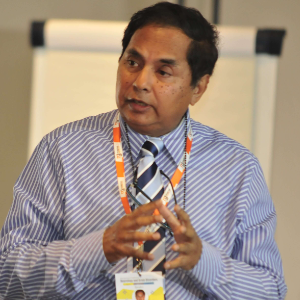Title : Multiple Sclerosis, corpus callosum and bedside test
Abstract:
Abstract: Demyelination affects highly myelinated structures like Corpus Callosum (CC). CC is unique in function that it connects right and left hemisphere. It synchronises bimanual or bipedal activities. Affecting CC can disturb synchrony between the two hemispheres will affect bimanual and bipedal tasks.
Methodology: Consecutive 70 Multiple Sclerosis patients from Outpatient clinics and Home visits were tests for bimanual hand function. Comparison of speed between rapid supination/pronation of left and right hand separately and then clapping of both hands supination/pronation of each hands alternatively. Patients has to do as fast as they could. Noticeable slowing of clapping was taken as a sign slowing down of conduction through CC. Exclusion criteria are upper limb power <3/5 MRC scale, Pain, visual impairment, intentional tremors, Stroke or cognitive impairment. Study period started from 01 09 2016.
Findings: 31 patients were excluded, 34 patients showed no noticeable difference, 2 patients were difficult to make conclusions and 3 patients showed definite slowing down in clapping.
Conclusion: It is possible to detect CC involvement by doing above bedside test. Positive patients will have difficulties in doing bimanual activities like mobility using two sticks, typing using keyboard, pushing wheel chair bimanually etc. etc. The magnitude of slowing down can be used as an indicator of the reference day (a good or a bad day). Clapping can also be used as an exercise for CC. It is difficult to test CC conduction speed electro physiologically. Sample size is not large enough and larger studies need to follow to validate the finding.
Audience Take away:
Audience will learn new easy bedside test for Corpus Callosum involvement in Multiple Sclerosis. It is very easy to do and even the patients can monitor by themselves the relative conduction speed of Corpus Callosum of a reference day. Progression of Corpus Callosum can be monitored as disease advances. The benefits of Disease Modifying Treatment on Corpus Callosum can be tested with this simple Bedside test. Clinical finding is more objective than Brain Scan findings. Researchers can correlate clinical findings and Brain Scan findings.




